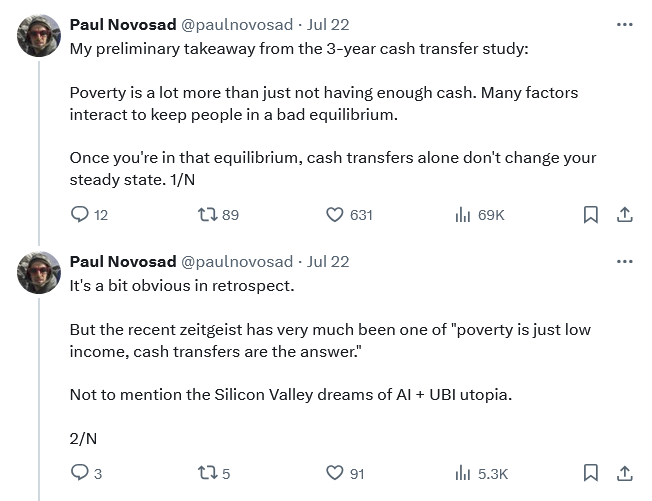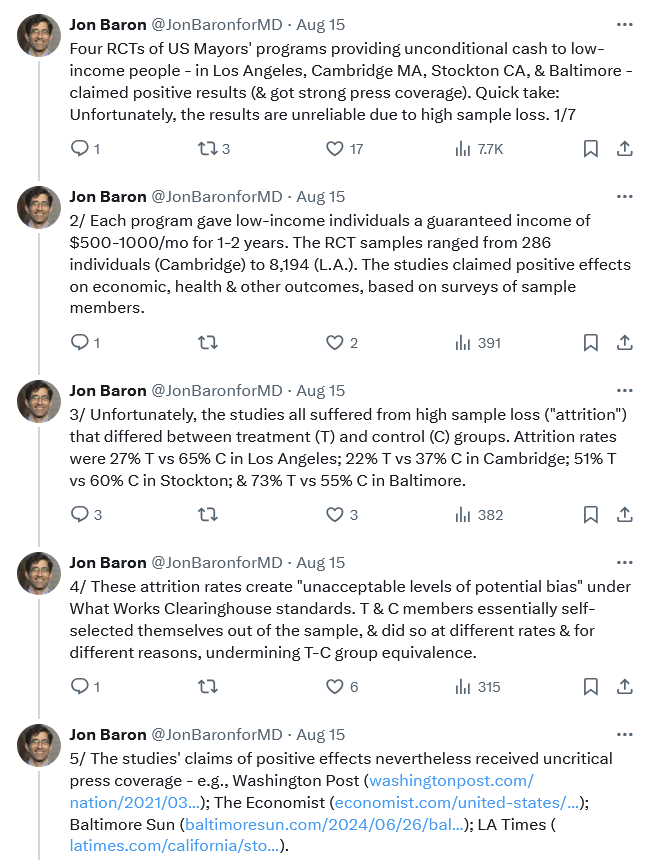Best of #econtwitter - Unconditional cash transfer ("UBI") experiments, special supplement
^three blockbuster papers out based on this experiment, so far. This edition of the newsletter will cover:
The extremely impressive methodology behind the papers (more exciting than it might sound)
Paper #1: effects on employment
Paper #2: effects on health
Paper #3: effects on consumption and household finance
Two points on interpretation
Briefly, five (!) separate papers on unconditional cash transfers that came out in the last month
+ some bonus sections throughout & at the end
The four paper threads (methodology; employment; health; HH finance) are extremely readable in full and dense with results. That said, the highlights:
Methodology
Again, $1000/month to the treatment group and $50/month to the control group, for 3 years:
^🤯🤯🤯🤯🤯🤯🤯
[several tweets about the extremely careful preanalysis plan]
Paper #1: effects on employment
Paper #2: effects on health
Paper #3: effects on consumption and household finance
Notes on interpretation
1. This is inherently partial equilibrium:
I don’t know that it is a “fundamental problem”, but e.g., the effects here are not the same as the effects of a national version of such a program (for one thing: how it is financed really^really matters)
2. These are the effects of temporary increases in income — this is extremely important:
The authors aren’t hiding these points, to be clear
Does this raise or lower the status of “UBI”
I didn’t even mention in this the table of contents, but predictably given the topic and especially given the results — in particular, that ‘employment went down’ — some people wanted to fight over UBI-like policies (again, “UBI” is not well-defined without further detail). Some representative threads of discussion:
^and a bunch of replies
Some related new/old papers
Five (!) other new papers on this topic, and one old one, over the last month:
^this is a good time to reemphasize point #2 above, on the time horizon of the treatment potentially really mattering (put another way: are we able to estimate part of the full matrix of intertemporal MPCs 🤓)
Meta
Anyway, props to the authors, props to OpenResearch, this stuff is amazing, if only everything could be like this:








































I have bookmarked this one. The data and analysis is comprehensive and good. But as with many social experiments that we turn into a scientific process, it seems the view of the forest is lost by all of the trees. Any honest cultural psychologist will explain that poverty does not just correlate with a lack of money. They will also explain that human psychological needs rage more strongly up the ladder. Once the lower level survival needs are satiated and the related resentment over their previous lacking subsides, the new target is just the next rungs moving up to self-actualization. We can see this play with our resident elite... the most educated and economically secure and still demonstrating resentment and rage that they don't have access to more. In fact phycologists have concluded a human phenomenon of people that have more are more determined to want more.
The pragmatic resulting view of all of this... we are better off creating better-paying job opportunities with some social benefits to supplement low-compensated work than to just hand over cash to people thinking it will improve their lives.